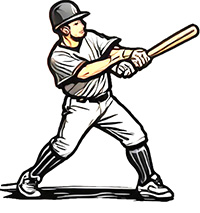The 10m multi-stage fitness test is an aerobic fitness test designed for children with cerebral palsy (CP) classified at Level I or Level II on the Gross Motor Function Classification System. The test was described by researchers at the Rehabilitation Centre De Hoogstraat, Utrecht, The Netherlands (Verschuren et al., 2006). This test is a variation of the 20m beep test. There is also a wheelchair version of this test: 10m Wheelchair Shuttle Test for those with CP. See also the similar 10m Incremental Shuttle Walk Test for people with COPD. See more on beep test modifications.
equipment required: Flat, non-slip surface, marking cones, 10m measuring tape, heart rate monitor, pre-recorded CD (can be created using the team beep test software)
pre-test: Explain the test procedures to the subject. Perform screening of health risks and obtain informed consent. Prepare forms and record basic information such as age, height, body weight, gender, test conditions. Measure and mark out the course. Ensure that the participants are adequately warmed-up. See more details of pre-test procedures.
test layout: The cones are placed 10 meters apart, with cones and tape marking the end points.
procedure: participants should wear regular sports clothing and shoes, and orthoses if applicable, and also wear a heart rate monitor. Children walk or run between the two markers at incremental speeds, in time to the pre-recorded cd. The test continues until the subject is unable to keep in sync with the recording.
variations: There are separate protocols for children at each CP GMFCS level (SRT-1 and SRT-2). The Level I shuttle run test (SRT-I) is for children classified at GMFCS Level 1 (ie, able to walk indoors and outdoors without restrictions). The SRT-I starts at 5 km/h. The Level II shuttle run test (SRT-II) is for children classified at GMFCS Level 2 (ie, able to walk indoors and outdoors with restrictions). The SRT-II starts at 2 km/h. The speed increases by 0.25 km/h every level (minute) for both tests. See also the similar 10m Incremental Shuttle Walk Test (ISWT)
scoring: The athlete's score is the level and number of shuttles (10m) reached before they were unable to keep up with the recording. The heart rate is read from the wrist monitor at the end of the test and noted. This heart rate can be used to check whether a person has performed maximally (heart rate > 180 bpm).
target population: children with cerebral palsy (CP)
reliability: The test has good test-retest reliability for exercise time (ICC coefficients of 0.97 for the SRT-I and 0.99 for the SRT-II) and reliability for peak heart rate attained during the final level (ICC coefficients of 0.87 for the SRT-I and 0.94 for the SRT-II).
validity: High correlations were found for the relationship between data for both shuttle run tests and data for the treadmill test (both r = 0.96).
disadvantages: As with all beep type tests, practice and motivation levels can influence the score attained, and the scoring can be subjective.
advantages: The standard 20m beep test is not suitable for many children, particularly if they have a disability, because the starting speed of 8 km/h and increase every minute are beyond their capabilities. Also, a beep type test for testing aerobic capacity in children with CP is a better alternative to treadmill protocols are often used in clinical practice, as most children with CP have problems with movement coordination and an equinus position of the foot, and the increasing speed and inclining floor of treadmill tests are problematic.
references:
- Verschuren O, Takken T, Ketelaar M, et al. Reliability and validity of data for 2 newly developed shuttle run tests in children with cerebral palsy. Phys Ther. 2006;86: 1107–1117.
- Verschuren O, Bloemen M, Kruitwagen C, Takken T. Reference values for aerobic fitness in children, adolescents, and young adults who have cerebral palsy and are ambulatory. Phys Ther. 2010 Aug;90(8):1148-56.
- Verschuren, Olaf and Takken, Tim. 10-meter Shuttle Run Test. Journal of Physiotherapy, Vol. 56, No. 2, 2010: 136.
Similar Tests
- 10m Incremental Shuttle Walk Test (ISWT) — 10m multi-stage walking shuttle test designed for patients with COPD.
- 10m Wheelchair Shuttle Test — 10m multi-stage wheelchair shuttle test for those with CP
- Beep Test for the Blind — 20m shuttle run test with modifications to assist those with vision impairment.
Related Pages
- Tests for the Disabled
- The complete guide to the beep test, for links to much more information.
- You can create your own variation of the beep test using the team beep test software.
- Modified beep tests
- Guide to Variations of the beep / bleep test.
- Beep Test Software — provides the standard Multistage Fitness Test or Bleep Test right on your PC or Laptop, with many additional features such as creating your own test version.
- About Sports for the Disabled


 Current Events
Current Events